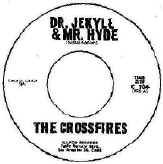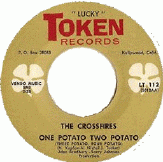The Instrumental Surf
Groups
"Dennis Wilson was the only Beach Boy that
surfed. This is the music he listened to after a long day of
Surfing."
Jim Pash, The Surfaris, 1991
The
Astronauts

L to R: Stormy Patterson, Jim Gallagher, Rich Fifield,
Dennis Lindsay, Bob Demmon
What made the Astronauts unusual is the fact that they were a
surf-type band from Colorado, not California.
They had a minor hit in 1963 with "Baja" and remained
successful for several years.
Members:
Jon Patterson - vocals/bass guitar
Jim Gallegher - drums
Rick Fifield - vocals/lead guitar
Dennis Lindsay - guitar
Bob Demmon - guitar
The Astronauts developed out of a group, The
Stormtroopers, which was originally formed at Boulder High
School, Boulder, Colorado in 1956 by Jon "Storm"
Patterson (vocals, guitar), Robert Graham "Bob" Demmon
February 1939 – 18 December 2010) (guitar), and Brad Leach
(drums). In 1961, they became The Astronauts after adding Richard
Otis "Rich" Fifield (vocals, guitar) and Dick Sellars
(guitar), the change of band name recognizing the fascist
connotations of the previous name and to pay tribute to local
hero, astronaut Scott Carpenter. Patterson switched to bass,
Leech was replaced on drums by Jim Gallagher, and soon afterwards
Sellars left to join the US Navy, being replaced by Dennis
Lindsey. With a line-up of Demmon, Patterson, Fifield, Lindsey
and Gallagher, the band gained a strong local reputation, toured
as far as Chicago and Dallas, Texas, and released their first
single, "Come Along Baby", in 1962, on the small
Palladium label. They were signed to RCA Records after a record
company executive was impressed by their performance at a local
night club, the Tulagi.
Their first single on RCA was "Baja",
an instrumental written by Lee Hazlewood originally for his
friend, guitarist Al Casey. Released by The Astronauts in early
1963, the track was described as "a typical surf
instrumental with a reverberation-heavy twangy guitar and driving
drumbeat", and reached # 94 on the Billboard Hot 100 for
just one week, the pinnacle of their US chart career. However,
they released a succession of further singles on RCA, in an
attempt by the record company to emulate the success of the Beach
Boys and other surf music-related groups in the charts at the
time. According to reviewer Richie Unterberger, "the group
shone brightest on their instrumentals, which used mounds of
Fender reverb and two rhythm guitars; when they sang, the results
were much less successful." Patterson and Fifield shared
lead vocals, and the band recorded songs by Roger Christian, Gary
Usher, Dick Dale and Henry Mancini, among others. Fifield, the
lead guitarist, used a Fender Jazzmaster on the recordings, with
an early prototype reverb unit personally loaned to the group by
Leo Fender. Their 1965 song "Tomorrow's Gonna Be Another Day
was covered by The Monkees in 1966.
As well as a succession of singles and EPs, the
band released four LPs over nine months, starting in May 1963:
Surfin' with The Astronauts – which reached # 61 on the
Billboard 200 album chart – Everything Is A-OK! (recorded
live at the Club Baja in Denver, Colorado), Competition Coupe,
and The Astronauts Orbit Campus (recorded live in Boulder).
They appeared several times on the Hullabaloo TV show, and have
the distinction of appearing in more beach party movies than any
other surf band: Surf Party, Wild on the Beach, Wild Wild Winter
and Out of Sight. Regarding the band's performance in 1964's Surf
Party, the book Pop Surf Culture states “The Astronauts bang
out a thick, reverb-laden instrumental called
‘Firewater,’ and their theme song ‘Surf
Party’ happens to be one of the best surf instrumentals ever
recorded.”
In 1964, their record company discovered that they had a growing
fan base in Japan, where they outsold The Beach Boys and toured
with The Ventures. Five albums and three singles made the top 10
there, with "Movin'" – re-titled as "Over The
Sun" – reaching number one in the country.
In all, they recorded nine albums. Gallagher and Lindsey were
drafted for Vietnam before the last album, Travelin' Men in 1967,
and were replaced by Mark Bretz and Rod Jenkins respectively.
Demmon also left, being replaced by Robert Carl McLerran, before
Fifield and Patterson finally decided to end the band name after
a tour of Asia in 1968.
Dennis Lindsey suferred a heart attack and died
during the summer of 1993.
The
Bel-Airs
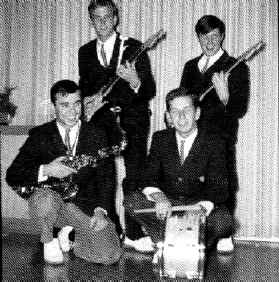
L to R: Chaz Stuart, Paul Johnson,
Richard Delvy, Eddie Bertrand
The Belairs were an early and influential surf rock band from
South Bay, Los Angeles, active in the early 1960s.
Members:
Chaz Stewart - saxophone
Richard Delvy - drums
Eddie Bertrand - lead guitar
John Roberts - piano
Paul Johnson - rhythm guitar
Steve Lotto - bass guitar
The Bel-Airs were an early and influential surf rock band from
South Bay, Los Angeles, active in the early 1960s
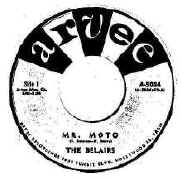
They were best known for their 1961 hit "Mr.
Moto", an instrumental surf rock song that featured a
flamenco-inspired intro and contained a melodic piano interlude.
The song's theme was used in the solo for the song
"Seed" by Sublime.
Upon splitting up, guitarist Eddie Bertrand formed Eddie &
the Showmen in 1964, while guitarist Paul Johnson joined Cat
Mother & the All Night Newsboys in 1970. Original Bel-Airs
drummer Dick Dodd joined Bertrand in Eddie & the Showmen, and
later joined the Standells, playing drums and singing lead on
their major 1966 hit, "Dirty Water". Richard Delvy
replaced Dick Dodd on drums and went on to found the surf group
the Challengers.
Johnson has continued in music, both in recording and as a
performer. Among other music associations, he has been a member
of the "Jim Fuller version" of the Surfaris since 1990.
Bertrand also continued in music, touring as Eddie and the
Soundwaves, among other performance configurations. Dodd has
participated in various reunions and later recordings of the
Standells.
Eddie Bertrand died of cancer in November 2012.
The
Challengers

(L-R) Back: Ed Fournier, Richard Delvay,
Art Fisher
Front: Phil Pruden, Randy Nauert
The Challengers were an instrumental surf rock band started in
Los Angeles, California, in late 1962. Their debut album,
Surfbeat, was the biggest-selling surf album of all time and
helped bring surf music from California to the rest of the world.
Members:
Richard Delvy - drums
Randy Nuert - bassist
Ed Fournier - guitar/vocals
Phil Pruden- saxophone
Jim Roberts - keyboard
Art Fisher - guitar
Glen Grey - lead guitar
Dan Landis - rhythm guitar
Rick Hefner - saxophone
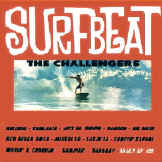
The Challengers were seen in a few of 1980s surf
band reunion concerts. Richard Delvy always kept in contact with
his band mates. His surf band history was extensive and he
maintained his friendships with his former Bel-Airs guitarist
Paul Johnson (PJ and the Galaxies) and Eddie Bertrand (Eddie
& the Showmen).In 1992 a local surf company owned by Brad
Jennings (The Early Sixties Company) signed a contract with Delvy
to reproduce the Challengers band LP covers and Rick Griffin
artwork for tee shirts and surf related products. That successful
relationship lasted for almost 20 years.
In 1995, after 25 years of no new recordings, The Challengers
reunited with some new members to release the album "New
Wave" produced by band leader and founder Richard Delvy.
Paul Johnson graciously joined the group to play guitar and
composed. Art Fisher played guitar on Mr.Moto, Ed Fournier
contributed a new song he wrote and Richard Delvy plays drums on
the new tracks. It was released on compact disc on the
independent label Atmosphere, Miraleste Music. Richard Delvy died
on February 6, 2010 ending his lifelong influence on music in the
Los Angeles area.
The
Crossfires
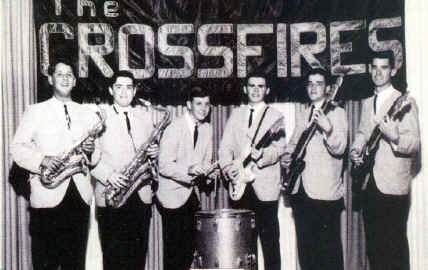
(L-R) Don Murray, Howard Kaylan, Mark
Volman , Al Nichols, Tom Stanton
Though a pretty fair surf band, the Crossfires' real claim to
fame is that the group somehow evolved into the pop/folk-group
stars the Turtles in the mid-'60s.
Members:
Don Murray - drums
Howard Kaylan (real name Howard Kaplan) -
vocals/tenor saxophone
Mark Volman - vocals/alto saxophone
Dale Walton - rhythm guitar replaced by Tom
Stantom replaced by Jim Tucker
Al Nichols - lead guitar
Chuck Portz - bass guitar
In early 1963, Howard
Kaylan and Californian Mark Volman attended the same school,
Westchester High in Los Angeles. The two sang in the school's a
cappella choir, where Volman soon heard about Kaylan's
instrumental surf music band, the Nightriders which included
Kaylan on saxophone and choir members Al Nichol on lead guitar,
Don Murray on drums and Chuck Portz on bass. Volman joined the
group as a saxophonist, just before the group changed name to the
Crossfires in the same year. After high school graduation, the
band continued on while its members attended area colleges,
picking up rhythm guitarist Jim Tucker along the way.
They released a single, "Dr. Jekyll &
Mr. Hyde" b/w "Fiberglass Jungle", on the local
"Capco Records" label 1963 With the help of KRLA
and KFWB DJ/club owner Reb Foster, the Crossfires signed to the
newly formed White Whale Records. Their second single, "One
Potato Two Potato," showed them edging toward garage rock,
and offered the only rough clue to the direction they would take
as the Turtles.
Adhering to the prevailing musical trend, the
group rebranded itself as a folk rock band under the name the
Tyrtles, an intentionally stylized misspelling inspired by The
Byrds and The Beatles. However, the trendy spelling did not
survive long, and they finally had to name themselves the
Turtles.
Because of the stylistic change from Surf music to Folk rock,
Kaylan and Volman dropped the saxophones to become the band's
vocalists. Kaylan became the group's lead singer, and
keyboardist, although he Nichol play most of the keyboard parts
to Nichol in their hits. Volman began to harmonize with Kaylan's
lead singing becoming a third guitarist, as well as a
percussionist, for the band.
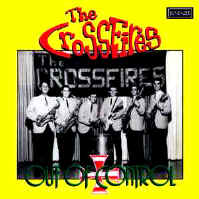
They set their sights on the adjacent South Bay
area (Redondo Beach, Manhattan Beach, Torrance) and quickly found
themselves winners of several Battle of the Bands competitions
that resulted in a residency at Reb Foster's (a local DJ)
Revelaire Club. The group also had a fan club of sorts, "the
Chunky Club," whose members made obscene genital gestures
with the help of spoons during band appearances. (For more
insight into this period, refer to the Crossfires album, Out of
Control) It was here that demands were made upon them to learn
the various hit recordings of stars like the Coasters, Sonny and
Cher, the Righteous Brothers and others for whom they would
occasionally become the backup band.
In 1964, the Beatles and the whole English Invasion took effect.
Mark and Howard put down their saxes, took up the vocals more
ardently (Howard did most of the leads, Mark backups and
tambourine) and the Crossfires dropped their entire repertoire of
surf instrumentals and grew their hair long.
Despite this response, and their following at the Revelaire,
frustration set in. The members weren't in high school anymore,
two were married, and the band wasn't earning enough money. In
1965, on the night they were submitting their resignation from
the Revelaire and about to break up, they were approached by Ted
Feigin and Lee Lasseff who signed them to a brand new , nameless
record label, later to be called White Whale. It was time for a
name change as well. The group liked "The Half Dozen,"
or "Six Pack," but opted for Reb Foster's suggestion,
The
Chantays
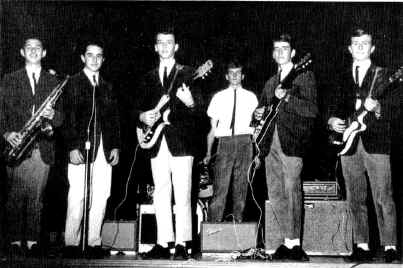
Original Chantay lineup circa 1963
(L-R) Jim Frias, Rob Marshall, Bob
Spickard, Bob Welch, Brian Carman, Walter Waltersl
The Chantays, sometimes credited as Chantay's, is an American
surf music band from Orange County, California, United States,
known for the hit instrumental "Pipeline" (1963).Their
music combine electronic keyboards and surf guitar, creating a
unique ghostly sound.
Members:
Bob Spickard - lead guitar/vocals
Bob Welch - drums
Warren Waters - bass guitar
Rob Marshall - piano
Brian Carmen - bass/rhythm guitar
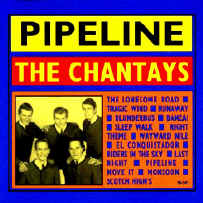
The Chantays were five high school students, Bob
Spickard, Brian Carman , Bob Welch, Warren Waters and Rob
Marshall from Santa Ana, CA. Playing school
dances and local clubs they were seen by agent Dale
Smallins. In December 1962, the group recorded and released
"Pipeline", which peaked at No. 4 on the Billboard Hot
100 in May 1963. The Chantays recorded their first album in 1963,
also titled Pipeline, which included "Blunderbus" and
"El Conquistador". Their follow-up album was Two Sides
of the Chantays in 1964.
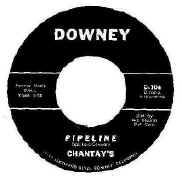
They had one of the biggest and best instrumental
surf hits, "Pipeline." Competent players who went heavy
on the rumbling bass, ghostly reverb, and electric keyboards,
they were very much a one - shot act; their repertoire was
crowded with rock & roll covers and "Pipeline"
sound alikes, and none of their follow - up singles
charted.
The Chantays toured Japan and the United States,
joining the Righteous Brothers and Roy Orbison on a few
occasions, and they were the only rock and roll band to perform
on The Lawrence Welk Show.
The Chantays have been honored for their contributions to music.
Highlights include being honored on April 12, 1996, by
Hollywood's Rock Walk, that was founded to honor individuals and
bands that have made lasting and important contribution s to
music. "Pipeline" is listed as one of the 500 Songs
that Shaped Rock and Roll. Along with Bill Medley of the
Righteous Brothers and Diane Keaton, the Chantays were honored by
the City of Santa Ana, California, and Santa Ana High School when
they named a street after them, Chantays Way. OC Weekly magazine
also named the Chantays as one of the Best Orange County Bands.
The Chantays are still playing. Original members Bob Spickard and
Bob Welch are joined by longtime members Ricky Lewis and Brian
Nussle. More recent albums include The Next Set (live recording)
and Waiting for the Tide. Some of the tracks are the new songs
"Crystal T" and "Killer Dana", along with
remakes of "Pipeline", "El Conquistador" and
"Blunderbus".
Brian Carman died at his home in Santa Ana, California, from
complications of Crohn's disease on March 1, 2015. He was 69.
Another longtime member Gil Orr died on September 19, 2017.
The
Duals
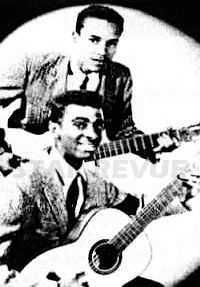
The Duals were an American surf rock duo formed in Los Angeles,
California, in 1961. Much of the collaboration's music
capitalized on the style of music popularized in Southern
California in the early 1960s. They reached the national charts
with their song "Stick Shift" which became the Duals'
only Top 40 hit.
| |
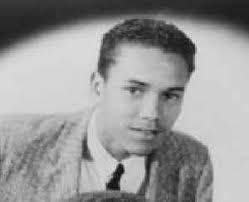
Henry Bellinger
|
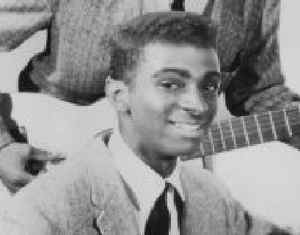
Johnny Lageman
|
|
Members:
Henry Bellinger - lead guitar
Johnny Lageman - rhythm guitar
The Duals were a short-lived
musical pair consisting of two young guys Henry Bellinger (lead
guitar) and Johnny Lageman (rhythm guitar). Both happened to live
on the same street in Los Angeles, California when a mutual
mutual friend introduced them to each other. They were just
nineteen when they met. The two were a rarity as a y black duo
who performed surf and hot rod music, the genre mostly favored by
white artists such as Jan and Dean and of course the Beach Boys.
However, the boys played virtually surf and hot rod
instrumentals. Almost immediately after the meeting, Bellinger
and Lageman decided to team up as musicians
Henry Bellinger was originally
from Colorado, but he and his family moved to Los Angeles. He
loved nearly all sorts of music and was proficient in playing the
piano and viola aside from guitar. At the time of their meeting
and formation as a musical duo, Bellinger was studying pre-law at
the Los Angeles City College.
Johnny Lageman, was from New
Orleans, Louisiana but moved to Los Angeles to live with his
brother. He first learned to play guitar when he was sixteen
years old. Ever since then, Lageman had been interested to become
a professional musician.
The two decided to approach
record labels to offer their material. First they approached H.B.
Barnum, but Barnum was too preoccupied with other artists. He had
doubts about their songs and especially the kind of music they
played. Instead, Barnum introduced the boys to his buddy Ron
Barrett, who had just established a new record label named Star
Revue. Unlike Barnum, Barrett liked Bellinger and Lageman’s
material, which he considered as having a "fresh, clean
simple sound." Barrett immediately signed the boys to his
new label Star Revue. After many rehearsal, The Duals recorded
"Stick Shift" and "Cruising" to which Barrett
added recorded car sound effects. At the time of their record
contract signing, the two boys by then had called themselves the
Duals.
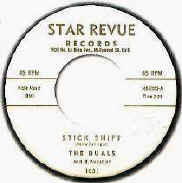
Sensing potential in "Stick Shift", Barrett took the
single to Sonny Bono who helped the record receive extensive
airplay in California. Sue Records bought the master tapes and
distributed the single to wider audiences late in 1961. The
single, the first instrumental hot rod recording to chart
nationally, influenced the popularity of car songs as it reached
number 25 on the Billboard Hot 100. Following the release of
"Stick Shift", the Duals performed in Philadelphia and
New York City. Despite their success, neither the Duals nor Star
Revue, however, received any royalties from Sue Records for
record sales until 2004.
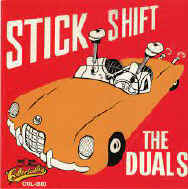
In late 1961, the duo released their first and
only studio album, named after their hit song. Two singles,
"Cha Cha Guitars " and "The Big Race", were
also released later in the year but flopped immediately. The
Duals disbanded soon after. In 1996 , Stick Shift was reissued on
CD on Collectables Records.
Despite the hit, the Duals as
well as Barrett had a difficult time dealing with it, because
they never received any payment from Sue Records. Thus a long,
legal battle had set in and eventually stretched for over four
decades. Finally, The Duals received their first paycheck in 2004
(through EMI Records) from earnings of their only hit single
"Stick Shift." However, Bellinger was deceased by then
so his son Ron Jr. received the money on his father’s
behalf.
Eddie
and the Showman

(L-R) Eddie Bertrand, Bob Knight, Larry
Carlton, Mike Miles (drums), Rob Edwards, Doug Hensen, cira 1965
Eddie and the Showmen were an American surf rock band of the
1960s, formed in Southern California by Eddie Bertrand, formerly
of The Bel-Airs.
Members:
Eddie Bertrand - lead guitar
Sterling Storm- saxophone replaced by Bob
Knight
Rob Edwards - rhythm guitar
Freddy Buxtom - bass guitar
John Anderson - rhythm guitar
Dick Dodd - drums replaced in 1964 by Michael
Mills
Brett Brady - rhythm guitar
Larry Carlton - rhythm guitar
Doug Hensen - bass
Eddie and the Showmen were an American surf rock band of the
1960s. Formed in Southern California by Eddie Bertrand, formerly
of The Bel-Airs, they released several singles on Liberty
Records. Their highest-charting single in Los Angeles was
"Mr. Rebel", which reached number four on the Wallichs
Music City Hit List on February 10, 1964.
The band originally formed because Bertrand wanted to move on
from the Bel-Airs. While the Bel-Airs focused more on guitar
interplay, and a moderate sound, Eddie & the Showmen played
more in the style of Dick Dale with a prominent lead guitar and
heavy sound. The band's original drummer was former Mouseketeer
Dick Dodd, who later joined The Standells. One of the guitar
players Larry Carlton later became a famous jazz guitarist, and
another was Rob Edwards of Colours who was the guitarist on the
title track for the surf movie, Pacifi Vibrations.

One of Eddie & the Showmen's biggest hits,
"Squad Car", was a cover version of the Bel-Airs track.
Eddie and the Showmen are included in the Hard Rock Cafe: Surf
1998 compilation of surf bands and surf music on track 11. Mr.
Rebel They are also included in The Birth of Surf compilation
track 20 Squad Car and are on 10 tracks of Toes on the Nose: 32
Surf Age Instrumentals compilation.
The
Frogmen
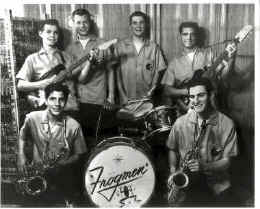
(l-r) Top:Dennis Farley, Larry Mnuk, Mike
Anderson, Jim Young
Bottom: Larry Bartone, Ray Sullivan
The Frogmen made just a few records in their short instrumental
career. The biggest hit by far was called Underwater
Members:
Jim Young - rhythm guitar
Dennis Farley - lead guitar
Mike Anderson - drums
Raymond Sullivan - alto saxophome
Larry Bartone - tenor saxophone
Lary Wnuk - piano
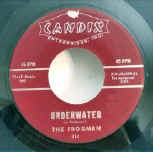
The Frogmen made just a few records in their
short instrumental career. The biggest hit by far was called
Underwater. It was a smoking instrumental picking up on the surf
scene in Southern California, and peaked at number 44 in 1961.
The first issue was on Candix Records. Reportedly, the group was
a six piece band from Culver City, California, and Rockin Records
lists the members as: Jim Young, Dennis Farley, Mike Anderson,
Raymond Sullivan, Larry Wnuk and Larry Bartone.
The
Lively Ones

(L-R) Ron Griffith, Jim Masoner, Tom
Fitzpatrick, Dave Garland, Ed Chiaverini
The Lively Ones were an instrumental surf rock band from USA,
active in Southern California in the 1960s.
Best known with these members:
Jim Masoner - lead guitar
Ed Chiaverini - rhythm guitar/vocals
Ron Griffith - bass guitar
Joel Willenberg - saxophone
Tim Fitzpatrick - drums
The Lively Ones were an American instrumental
surf rock band active in Southern California in the 1960s. They
played live mostly in California and Arizona. They recorded for
Del-Fi records with production from Bob Keane. They recorded
mostly cover songs, but there were a few originals.

Their 1963 song "Surf Rider" (written
by Nokie Edwards from The Ventures) was featured in the final
sequence as well as the end credits of Quentin Tarantino's 1994
film Pulp Fiction.
The
Original Surfaris
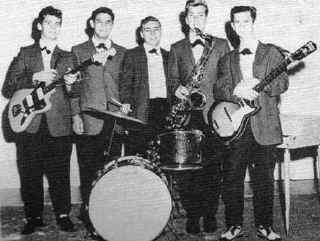
(L-R) Larry Weed, Al Valdez, Mike Biondo,
Doug Wiseman, Bobby Esco
The original Surfaris were at once one of the most highly
regarded and one of the most obscure of the instrumental surf
groups of the sixties.
Members:
Larry Weed - lead guitar
Al Valdez - piano
Mike Biondo - drms
Doug Wiseman - saxophone
Bobby Esco - guitar
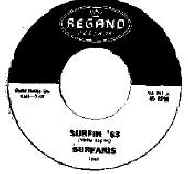
In 1960, three young friends, Al Valdez at the
piano, Mike Biondo on drums, and Richard Lippy played at the 8th
grade graduation dance of St. Mary's Elementary School in
Fullerton, California.
In the summer of the same year, Valdez, Biondo, guitarist Bobby
Esco, and sax player Bob Bernard formed The Vogues and started
playing at school assemblies.
Guitarist Larry Weed, with a country and western musical
background, replaced Esco soon after. Weed, notably, used to wear
his belt buckle on the side when onstage, "so he would not
scratch the back of his Fender guitar".
In late 1961, a Sunday morning all-Mexican television show on
KCHOP channel 13 announced that they were looking for musical
groups to play on the show, and Valdez's mother phoned the show
to submit the candidacy of the band her son was playing in The
Vogues, with Doug Wiseman having replaced Bob Bernard on sax,
were contacted by Victor Regina, owner of a pizza stand on
Western Avenue, also doubling as a music agent, who helped them,
under the new name he gave them, The Customs, record their first
single, "Steppin' Out" and "Hi Hat", both
written by former member Bobby Esco. Because Regina had put up
all the money for the recording session, he took sole credit as
the composer of the two songs.
Bassist Jim Tran, who was playing in a Yorba Linda musical trio
at the time, was added to the band, soon after the session Around
the early summer of 1962, they started appearing regularly at a
bar near Big Bear, with Wiseman's and Biondo's dads driving them
there. Soon after, with Chuck Vehle also on guitar, they changed
their name to The Surfaris, which was a word play between
"surf" and "The Safaris", a music group well
known at the time for their hit "Image of a Girl".
The Danville Battle of the Bands gave the group a lot of exposure
and more jobs. They started playing in the Ventura/Oxnardea.
While performing there, they backed Bobby Vinton and others.
Between October 1962 and through January 1963, they recorded in
the studio of producer Tony Hilder a number of songs written by
Larry Weed, such as "Moment of Truth" and "Delano
Soul Beat", also recording covers of "Ghost Riders in
the Sky" and "Pipeline". The tracks "Moment
of Truth" and "Delano Soul Beat" were released on
Hilder's own Impact label, as part ofa surf music compilation
album titled Shake, Shout and Soul. These tracks subsequently
appeared on various compilation albums, such as Wheels (Diplomat
Records LP 2309); The World of Surfin' (Almor LP 108); Surf's Up
at Banzai Pipeline (Northridge Records LP 101); and others.
After some months, the band again went into the studio with
Hilder producing and recorded a number of tracks intended to be
released on the Impact label, as their first full-length LP. Two
of the tracks, "Bombora" and "Surfari" were
leased to Del-Fi Records, which sent them out as a single. But
the record, even though it started selling well in the state had
to be pulled from the stores because of a lawsuit.
It was in early 1963 that, while the band was on the road, the
surf instrumental "Wipe Out" came out and broke big
nationwi e.[4] It was written and performed by a Glendora,
California band who also called themselves The Surfaris. The
Glendora group's management sued for the exclusive use of the
name and, in the trial that followed, the judge awarded them sole
use of "The Surfaris". However, the judge also allowed
the Fullerton band to carry on under the name The Original
Surfaris, although they continued to be billed in the various
venues they played as "The Surfaris".
After recording hot rod tracks, such as "Gum-Dipped
Slicks", The Original Surfaris started changing their
musical style and Jim Tran along with Al Valdez left the group.
The Original Surfaris started doing more vocals, in the soul and
blues vein, until eventually breaking up in May 1965.
Dave Myers and the Surftones

L to R: Bob Hurtley, Bob Korosco, Dave
Myers, Joe Curtis, Johnny Miller
Dave Myers and The Surftones were a Southern California
surf group who are most likely remembered for the few singles
they recorded in the 1960s which include their cover of The
Revels hit "Church Key" and their time at the
Rendezvous Ballroom in Balboa, California.
Members:
Dave Myers - lead guitar
Bob Hurtly - sax
Bob Morosco - drums
Jon Curtis - rhythm guitar
Johnny Miller - bass
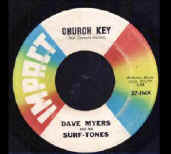
One of the better Southern Californian
instrumental surf groups from the heyday of the genre circa
1962-63, Dave Myers and the Surftones issued a decent LP for
Del-Fi in 1963 in the style of Dick Dale, though not as raunchy.
The similarity to Dick Dale is understandable, since the group
took over from Dale as the house band at the Rendezvous Ballroom
in Balboa, California. Also Myers and his men, like Dale, used
the same kind of equipment, in particular Fender guitars and
amps, which helped create a powerful reverb sound. Myers, and all
but one of the Surftones, were music majors in college, which put
them ahead of many rival surf bands in skills. Myers himself
played tenor sax, trumpet, bongos, and steel guitar in addition
to electric guitar, which he played on a specially made Mosrite
that was designed to look like flames.
Myers and the Surftones' Del-Fi album, Hangin' Twenty, was a cool
and varied, though not stunning, set that included R&B-driven
tunes with sax, moody minor-key cuts, and languid ballads with
the kind of middle eastern-informed melodies also employed by
Dick Dale. In 1964 they renamed themselves Dave Myers and the
Disciples for a vocal single, and then went back to instrumental
music, but changed their name again, for the album Greatest
Racing Themes (which was billed to the Dave Myers Effect). Myers
didn't record again, although he continued to work as a
professional musician until the end of the 1960s. One of Myers
and the Surftones' stronger tracks, "Moment of Truth, "
appears on Rhino's Cowabunga! The Surf Box Set.
The Surftones were from Laguna Beach. The majority of the group
had majored in music at college. Myers himself was a
ulti-instrumentalist. As well as playing guitar, he played steel
guitar, tenor sax, trumpet and bongos. Their lineup in 1962
consisted of Dave Myers on lead guitar, Jon Curtis on rhythm
guitar, Johnny Miller on bass guitar, Bob Hurtly on saxophone,
and Bob Morosco on drums.
In 1962, Dave Myers and his group as well as another group called
the Rhythm Rockers were regulars at the Rendezvous Ballroom in
Balboa, California. They became the house band at venue, having
taken over from Dick Dale and his band. Myers's father owned a
store that was visited by Bob Hafner who was the partner of Tony
Hilder. One day Hafner and Myers Sr. were having a conversation
that got on to the subject of music. A short time later Hilder
turned up. He came to one of their practice sessions and heard
their version of "Church Key", a song he held the
rights to. They would end up having two singles released on
Hilder's Impact label. They were "Moment Of Truth" bw
"Frogwalk" . They also covered The Revels hit
"Church Key" bw "Passion" as Dave Myers and
his Surf-Tones.
In late 1963, drummer Bob Callwell left the group. He was
replaced by Ross van Kleist. Also in late 1963, the group played
at the Second Annual Surf Fair, held at the Santa Monica
Auditorium. This live event was recorded live and released on the
Impact label as Shake! Shout! & Soul.
In 1964 Dave Myers and his group recorded a vocal single. After
that he was playing instrumental music. In the mid-1960s, he
recorded as the Dave Myers Effect, releasing an album called
Greatest Racing Themes. It was later released on the Carole label
in 1968. This album was produced by Larry Brown a/k/a Lawrence
Brown who provided the music for the 1968 biker film, The Angry
Breed.
The
Pyramids

(L-R) Front: Tom Pitman, Willy Glover,
Skip Mercier, Steve Leonard
Back: Ron McMullen on drums - 1963
In early 1964, the Pyramids made the Top 20 with
"Penetration," the last big national instrumental surf
hit,
Members:
Skip Mercier - lead
guitar
Ron McMullen - drums - replaced by Drake
Jenkins in 1964
Tom Pitman - saxophone
Willian Glover - rhythm guitar
Steve Leonard - bass guitar
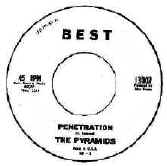
One of the last surf bands to emerge, the
Pyramids were one of the best marketed. When their initial
single "The Pyramid Stomp" fizzled nationally, the
group's bassist Steve Leonard decided to analyzed the Chantay's
"Pipeline" and came up with a clever variation of that
opening reverb riff. In early 1964, The Pyramids made the Top 20
with "Penetration, helped by the promotion of John Hodge,
the group's manager. The Long Beach, California group
achieved some notoriety after Hodge convinced them to shave their
heads just as the British Invasion and became "America's
answer to the Beatles." During their concerts they'd wear
Beatle wigs which they would throw to the audience halfway
through the show revealing their bald heads. Hired girls would
then storm the stage. Other gimmicks were arriving at a job
on elephants or in a helicopter. The gimmicks worked and they
were soon appearing on Bandstand and Hullabaloo
and in the beach movie Bikini Beach. Hodge wasn't
as good at investing the money as he was at helping them earn it.
After several bad investments they disbanded after
recording one album and a few non - hit singles.
The Rebels
aka Rockin' Rebels
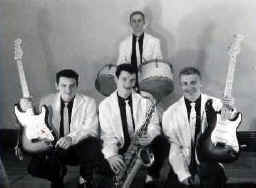
Top: Tom Gorman
Bottom L-R: Jimmy Kipler. Mickey Kippler, Paul Balon
The Rebels (also known as The Rockin' Rebels) were a band from
Buffalo, New York were known for their instrumental "Wild
Weekend"
Members:
Jimmy Kipler - guitar
Mickey Kipler - saxophone
Paul Balon - bass guitar
Tom Gorman - drums
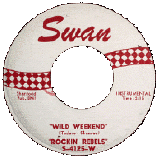
"Wild Weekend" was written by radio
entertainer Tom Shannon and Phil Todaro as a theme song for
Shannon's WKBW weekend radio show. The lyrics were: "Top
tunes, news and weather, so glad we can get together on the Tom
Shannon show KB radio It was recorded with vocals and music by
the Russ Hallet trio.
A local band, the Buffalo Rebels – or just Rebels – who
asked Shannon to play at a record hop also asked if they could
play an instrumental-only version of his theme song. They did,
and Shannon and Todaro thought there was something to it. They
moved the group to a recording studio in the same building where
they had a production office. The record came out locally and was
a hit, but since it wasn't on a major label, the song did not go
any further. It came out on Marlee Records (ML0094) and Casino
Records (1307).
Two years later the track was re-issued on Swan Records (Swan
4125). It sold more than 1 million copies, peaked at No. 8 on the
Billboard charts and earned an appearance for the band on Dick
Clark's "American Bandstand" TV show. The Rockin'
Rebels were inducted into the Buffalo Music Hall of Fame in 2002.
To avoid confusion with Duane Eddy and his Rebels, the Rebels
became the Rockin' Rebels. Swan pressings can be found with
either name; the British Stateside pressings had
"Rockin'". The band's 1963 LP uses the name "The
Rockin' Rebels" While the instrumental is the best-known
version, the original lyrics were, as mentioned above, a promo
for the Shannon radio show. Shannon would tweak the lyrics when
he moved to WHTT many years later.
Paul Balon died of heart disease on December 17, 2003 at age 61.
Tom Gorman died; however, no information about his death is
available.
Shannon retired in 2005. He died May 26, 2021 in California,
following a brief illness.
The
Revels
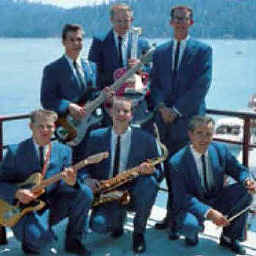
Top (L-R)
Bottom (L-R)
The band was formed out of the pioneer surf bands called The
Bel-Airs - Challengers
Members:
Dan Darnold: guitar, vocals
Sam Eddy: piano
Ron Fanunkin: saxophone
Norman Knowles: saxophone
Jim Macrae: drums
Gil Serna: guitar
Vince Tempesta drums
Dave Davis guitar
The group started in the mid-to-late 1950s as a
high school band in San Luis Obispo, California called Gil
Serna & The Rockets, before changing their name to The Revels
in 1959. Although their instrumental style predated the
1961-65 era of surf music, their success came during that period.
They are usually considered a "pre-surf" band and were
the original Central California coastal instrumental band. Other
bands from the area later included the more popular groups named
The Sentinels and The Impacts.
The Revels singles were collected on their sole album, Revels on
a Rampage (1964). They also composed music for the soundtrack of
the 1961 film The Exiles.
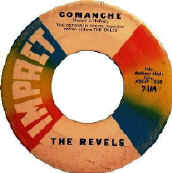
Their 1961 song "Comanche" has been
featured on two soundtracks. It first appeared as the
"Detoured Theme" in The Exiles.[2] It was later
included along with several other Surf music hits on the
soundtrack of the film, Pulp Fiction (1994).
Another member, Norman Knowles, had offered to manage the
Sentinels who had a hit with "Latin'ia". In addition to
managing The Sentinels he wrote "Church Key" and
"Intoxicate".
The
Rumblers
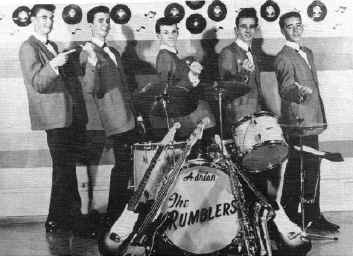
(L-R): Wayne Matteson, Mike Kelishes,
Adrian Lloyd, Johnny Kirland, Bob Jones, 1963
The Rumblers are known mostly for their one instrumental hit,
"Boss," which made it to number 52 in early 1963.
Members:
Wayne Matteson - bass guitar
Johnny Kirkland - lead guitar
Mike Kelishes - guitar
Eddie Baaracco - drums
Adrian Lloyd - drums/vocals
Greg Crowner - drums
Bob Jones - saxophone
Dave Allen - saxophone
Rick Delong - saxophone
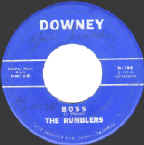
The Rumblers are known mostly for their one
instrumental hit, "Boss," which made it to number 52 in
early 1963. The Southern Californian group, however, recorded
quite a bit in the subsequent two years, never repeating the
success of "Boss." Though sometimes thought of as a
surf band, they recorded in a variety of raucous instrumental
rock & roll styles, as well as doing some vocal numbers. The
Rumblers were formed at the end of the '50s by teenagers in the
Los Angeles suburb of Norwalk, and by 1962, were doing some
recording, hooking up with the small independent Downey label
(based in the L.A. suburb of the same name). Downey had just one
big hit, the Chantays' 1963 surf classic "Pipeline,"
and couldn't replicate the same level of success with the
Rumblers, though "Boss" got to the Top Ten at some
local stations, going all the way to number two on KFWB in Los
Angeles. "Boss" and their local popularity, however,
were enough to get them an LP on Downey and numerous follow-up
45s, including some recordings done under different names, such
as the Nylons and Bel Canto's, whose "Feel Aw Right"
has an arrangement by a young Barry White. Distinguished from
some other acts associated with the surf scene by their prominent
use of saxophones (at one point the lineup included two sax
players) and a heavier R&B orientation, the Rumblers broke up
in late 1965 after guitarist Johnny Kirkland was drafted. They
evolved into the Interns, who had a 1967 single in the vocal
garage-pop-rock style whose popularity had made surf music
largely a thing of the past.
The
Surfaris
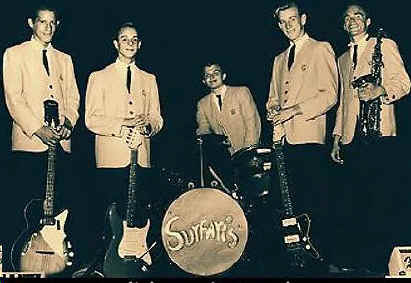
(L-R) Pat Conolly, Jim Fuller, Ron
Wilson, Bob Berryhill, Jim Pash, 1963
The Surfaris are best known for two songs that hit the charts in
the Los Angeles area, and nationally by May 1963:
"Surfer Joe" and "Wipe Out", which were the
A-side and B-side of the same 45 rpm single.
Members:
Jim Pash - saxophone/guitar
Jim Fuller - lead/bass guitar
Bob Berryhill - rhythm guitar
Pat Connolly - bass guitar
Ron Wilson - drums/vocals
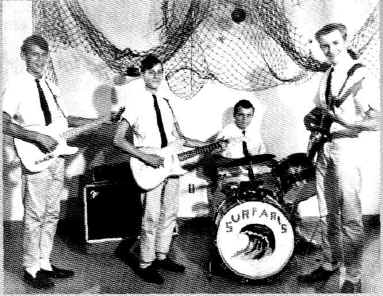
Original Surfari lineup 1962
( l-r) Pat Conelly, Jim Fuller, Ron Wilson, Bob
Berryhill
The group's rise literally started with a dream
by its drummer Ron Wilson. One day he woke up with
lyrics in his head about a surfer and his
travails, based on a real life brother of one of the
band members.
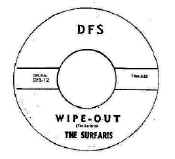
Glendora, CA surf group remembered for "Wipe
Out," the number two 1963 hit that ranks as one of the great
rock instrumentals, featuring a classic up - and - down guitar
riff and a classic solo drum roll break, both of which were
emulated by millions (the number is no exaggeration) of beginning
rock & rollers. They recorded an astonishing number of albums
(about half a dozen) and singles in the mid - '60s; the
"Wipe Out" follow - up "Point Panic" was the
only one to struggle up to the middle of the charts. The Surfaris
were not extraordinary, but they were more talented than the
typical one - shot surf group; drummer Ron Wilson was praised by
session stickman extraordinary Hal Blaine, and his uninhibited
splashing style sounds like a direct ancestor to Keith Moon. He
also took the lead vocals on the group's occasional passable
Beach Boy imitations.
The
Tornadoes
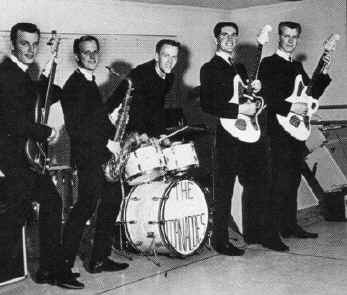
L to R: Jesse Sanders, Norman Sanders,
Leonard Delvaney, Gerald Sanders, Joel White
Members:
Jesse Sanders - rhythm guitar
Roly (Norman) Sanders - lead guitar
Gerald Sanders - bass guitar/vocals
George White - saxophone
Leonard Delaney - drums
The Tornadoes were an American surf band from
Redlands, California. They were the second band to receive
national airplay with a surf instrumental (after The Marketts),
with their song "Bustin' Surfboards", released on
Aertaun Records in 1962. "Bustin' Surfboards" has since
become a classic and mainstay of the surf genre. One of its
distinctions, and appeals, was that the song opened with the
sound of an ocean swell (that continued throughout the song),
thereby creating a sense of being at a beach. The album with the
same name was belatedly released on September 20, 1963. The band,
however, did not manage to follow up on their success. Their song
"Shootin' Beavers" was banned from airplay because of
its suggestive title. The band temporarily changed their name to
The Hollywood Tornadoes, because the British band, the
Tornado(e)s, were charting with the song "Telstar."
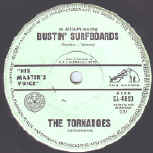
"Bustin' Surfboards" was included on
the Pulp Fiction soundtrack in 1994, thereby renewing interest in
the band. The Tornadoes continued to perform through 2007.
Members as of 2007 (including four members of the original band)
were brothers Gerald (bass) and Norman "Roly" Sanders
(lead guitar), their cousin Jesse Sanders (rhythm guitar),
Leonard Delaney (drums) and Joel Willenbring (saxophone).
In 2005, they released a CD called Now and Then on the Crossfire
Publications label containing 29 tracks, including live
recordings from their performance at the Zappanale concert in
Germany in 2003, cuts from a 1998 CD,and two new recordings. The
2006 Crossfire Publications CD Charge Of The Tornadoes featured
more of their '60s masters and Zappanale performances.
The band announced on their website that they would retire and
cease performing as of November 2008, but the band has since
decided to continue. During a conversation with Crossfire
Publications head, Greg Russo, on July 13, 2014, Tornadoes leader
Gerald Sanders confirmed that the band is still active.
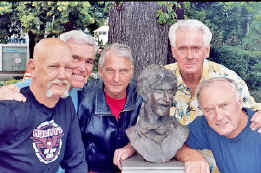
Germany 2020 Zappanale Festival
(L-R) Jesse Sanders, Roly Sanders, Joel Willenbring, Leonard
Delaney, Gerald Sanders
Leonard Delaney, died on October 5, 2014, aged
71, in San Bernardino, California, from complications of
Alzheimer's disease.
Jesse Sanders died on June 7, 2020 in Redlands, California.
The Ventures
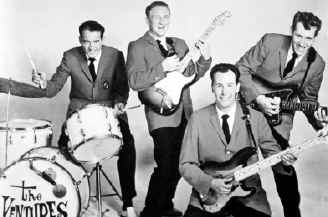
(L-R) Howie Johnson, Don Wilson, Nokie
Edwards and Bob Bogle
The Ventures are one of the first, best, most lasting and
influential of instrumental guitar based combos.
Members:
Nokie Edwards - lead guitar
Don Wilson - guitar
Bob Bogle - guitar
Howie Johnson - drums - replaced by Joe
Barili
The Ventures, originally the Versatones, were formed by Bob
Bogle in 1959, in Seattle, Washington.
Bob was born in Oklahoma but grew up in Portland Oregon. Bogle
had started playing guitar by his teens. In his mid-teens Bogle
moved to Seattle to work where he supported himself by bringing
wet cement to bricklayers. There he met Don Wilson, who had
learned trombone and piano as a child, and bass and guitar while
in the army. By mid-1959 they had begun playing in local clubs.
They soon added Nokie Edwards, who they had met while doing a
local TV show in Tacoma. Eventually they completed the group with
Howie Johnson on the drums.
Their first demo "Walk Don't Run" was sent to
various record companies. Receiving no response, Wilson's mother
released it on her own Blue Horizon label. "Walk Don't
Run"was picked up for distribution by Dolton Records
(distributed by Liberty), the group re-named, and became an
instant regional hit in 1960. In August 1960 "Walk Don't
Run" became a #2 hit. The Ventures followed it with a rock
version of "Ghost Riders in the Sky, then "Perfidia,
"Lullaby of the Leaves," "Diamond Head," and
2,000 Pound Bee," all which were hits through the early and
mid-Sixties.
In the wake of the success of Walk Don't Run, Wilson and Bogel
left their jobs in the building industry to pursue music full
time. The group issued a cover of Perfidia, a Latin song that had
been made popular by Alberto Dominguez in 1939. Perfidia reached
#15.

Photo courtesy The Fabulous Ventures
(l to r) Don Wilson, Mel Taylor, Nokie Edwards, and Bob Bogle
In 1961 Johnson was replaced by Mel Taylor after he was hurt
in an automobile accident and left the group. Hits kept coming
with versions of "The Lonely Bull" and "I Walk the
Line" in 1963 and a top ten surf remake of "Walk Don't
Run" in 1964. In 1965 they released what was one of the
first instructional records, Play Guitar with the Ventures.
In 1967 Edwards was replaced by Jerry McGee, who left in 1970
to record with Delaney and Bonnie Bramlett, after which Edwards
returned. By that time keyboardist Johnny Durrill had expanded
the Ventures to a quintet and the group had delved into fuzz-tone
and wah-wah guitar modification as well blues, calypso, and Latin
material.

Photo courtesy The Fabulous Ventures
(l to r) Bob Bogle, Jerry McGee, Don Wilson, and Mel Taylor
Throughout the 60's and 70's there were several personnel
changes. Nokie Edwards left and was replaced by Jerry
McGee. Edwards later returned to the Ventures, and left again.
Keyboard player John Durrill joined the group in the late 60's.
Mel Taylor left at one point and formed his own group, Mel Taylor
and the Dynamics, but later returned to the group. Some of the
artists who worked as guests or session players with the Ventures
in the 60's included Leon Russell, Harvey Mandel, and David
Gates.
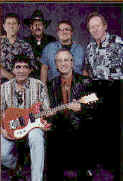
Ventures 1996
In 1969 the Ventures had a hit with a version of the theme
from the TV show Hawaii Five-O. In 1981, with Bogle, Wilson,
Edwards, and Taylor, they released a regional West Coast single
"Surfin' and Spyin,'" and embarked on a successful tour
of the U.S. and Japan. Bogle, Wilson, and McGee are still active
in the group. Mel Taylor passed away in August, 1996.

The Ventures Official
Web Page







